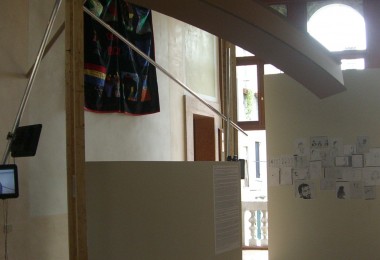Translation Romani has decided to maintain use of the word Romani in all language versions of this website, inclusively and in reference both to the language and people of all the diverse ethnic communities throughout the world, i.e. Roma, Sinti, Manuš, Calé, Romanichal, Kalé, and many others. Please read the important notes from our translators for explanations and other translations currently in use locally, nationally or regionally.
Close this box.
Activism implies an organized effort to effect social, political, legal or economic change, often through protest, dissent, collective movement, collaboration, civil disobedience, etc. While Romani history is replete with diverse efforts to collectively organize on some level for change, two events signal the earliest attempts at a more truly global, transnational Romani activism. In 1971, traditional nation-state symbols were adopted at the first World Romani Congress. They include a flag, an anthem (Djelem Djelem), a motto (Opre Roma!) and an international day (April 8). In 1978, the International Romani Union, or IRU, was officially established at the second World Romani Congress, in a collective effort to lobby for rights and representation on behalf of Romani peoples worldwide. Over the years, it has discussed such issues as Holocaust reparations, assimilation versus integration, language standardization, Romani history, and nationhood (territorial and non-territorial). A second international, transnational organization, the Roma National Congress, emerged in the 1980s.
However, with the creation and enlargement of the European Union, of which Romani communities now constitute the largest ethnic minority, activists in many areas gradually focused more concertedly on the acquisition of rights and on the solution of problems within a European context. Earlier endeavors to advocate for Romani rights had worked primarily through the mechanisms of international entities such as the United Nations. For example, in 1979 the IRU, comprised of local and national associations and organizations as well as individuals, obtained consultative status at the UN Social and Economic Commission. Later attempts to obtain basic rights and representation have sought to proceed through the institutional channels of Europe. A few such examples include the European Roma Rights Centre (Research and Advocacy), the European Roma Information Office (Guidelines on Roma Media Activism), the European Roma and Travelers Forum (Charter on the Rights of Roma) and the Decade of Roma Inclusion. Many other organizations and networks have arisen as well over the past two decades, including projects such as the Roma Education Fund, and Roma Initiatives and Roma Health Project, funded through the Open Society Institute (Soros Foundation). Nonetheless, it is generally acknowledged that many organizations, institutions and NGOs do not have the proper infrastructure or sufficient resources to facilitate change quickly enough, particularly when dealing with myriad practical problems on the ground: discrimination, persecution, inadequate housing, lack of access to medical care and other social programs, as well as education and employment. Locally, organizations such as Romani CRISS in Romania attempt to network through partners and donors to help meet education and health care needs as well as provide legal defense when necessary.
Romani peoples do not constitute an ethnic majority in any of the many nation-states of the world where they reside. In the opinion of some activists, attempting to consolidate a transnational political identity based on policies or projects that exclude Romani peoples outside of Europe only serves to hinder efforts that advocate for recognition and representation in terms of human rights, linguistic and cultural rights, and legal, medical or educational reform in the global community of nations internationally. Clearly, dissemination of information to raise awareness, through festivals, museums, local communities and academia, among others, remains a high priority. At the same time, communication, computer and Web technologies, as well as social networks, have inspired online activism and advocacy. Networks of communities are able to organize public events and inform the public at large about racism and discrimination, and to voice support for women`s rights and education. Finally, translators as well can be considered agents of significant social change, as translation studies research on translation activists and translation movements continues to reveal.
References:
Fact Sheets on Roma, "Institutionalisation and Emancipation", Council of Europe Romani Projekt, University of Graz, Austria. Available online.
Feys, Cara, "Towards a New Paradigm of the Nation: The Case of the Roma", PATRIN. Available online.
Goodwin, Morag (2004), "The Romani Claim to Non-Territorial Nation Status. Recognition from an International Legal Perspective", ERRC. Available online.
Klímová-Alexander, Ilona (2005), The Romani Voice in World Politics. The United Nations and Non-State Actors (Aldershot: Ashgate Publishing Ltd.)
Liégeois, Jean-Pierre (2007), Roms en Europe (Strasbourg: Éditions du Conseil de l`Europe.
Pogány, István (2004), The Roma Café. Human Rights & The Plight of the Romani People, London: Pluto Press.
Sigona, Nando and Trehan, Nidhi (eds), Romani Politics in Contemporary Europe. Poverty, Ethnic Mobilization, and the Neoliberal Order (New York: Palgrave Macmillan, 2009).
Tymoczko, Maria (2010), Translation, Resistance, Activism, Amherst, Boston: University of Massachusetts Press.
Vermeersch, Peter (2006), The Romani Movement. Minority Politics & Ethnic Mobilization in Contemporary Central Europe, New York, Oxford: Berghahn Books.
Wikipedia, "World Romani Congress", "Flag of the Romani People", "Romani Anthem", "International Romani Day", and "International Romani Union". Accessed Oct 2, 2011.
Willers, Marc (ed), Ensuring access to rights for Roma and Travellers. The role of the European Court of Human Rights (Strasbourg: Council of Europe, 2009). Available online.

Xa sastimasa (Kalderash)
Lasho appetito! (Lovari)
Han sastimasa/sastipaja (Xoraxane)


